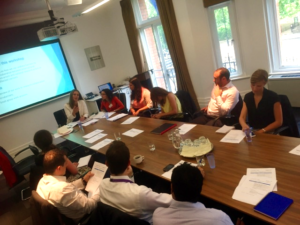Dutch Embassy Event: Barriers to Collaboration
In conflict-affected environments, it is often when peacebuilding is highly focused on doing ‘things right’ that we might lose sight of whether we are doing the ‘right thing’.
To bridge this gap, the international development community has recognised the need for and importance of working with national research actors in such contexts. Their expertise and unique understanding of these environments provide invaluable guidance. Notwithstanding, there are still numerous barriers that constrain research partnerships in fragile, conflict-affected environments.
Earlier this year, we conducted workshops in Bamako, Juba and Beirut

The team discussing ideas at the Embassy
(focusing on Syria) to better understand these barriers and develop ways to overcome them. On 25 June, Integrity and SpringFactor hosted a workshop at the Embassy of the Netherlands in London to present these findings and receive expert feedback.
The participants (19 in total) included donor representatives from the UK and the Netherlands, international consultancies, think tanks and NGOs, as well as independent experts.
The group – led by Integrity and SpringFactor – explored the processes by which barriers to effective research collaboration may be tackled. The need for “early collaboration” to ensure that national and local researchers to be involved from as early on as the design stage of the research cycle in international programming was strongly emphasised. This would allow for them to input more meaningfully from the get-go. Additionally, others held the view that “international donors need to take more risks and give national researchers a chance” during the process of procuring research for their programmes.
Integrity and SpringFactor would like to thank the Embassy of the Kingdom of the Netherlands in London for hosting this event, and for encouraging future Anglo-Dutch partnerships on research collaboration.
